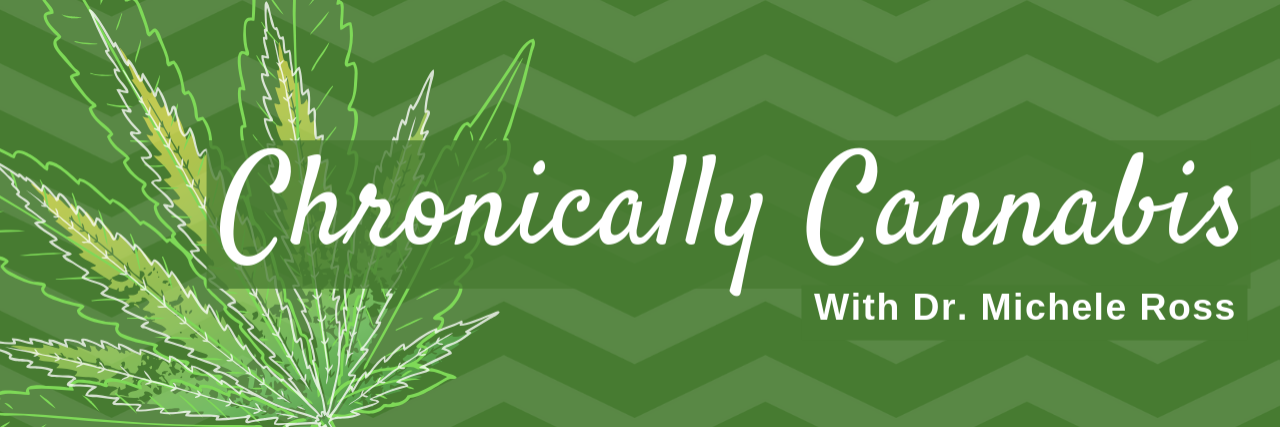Chronically Cannabis With Dr. Michele Ross: How Does Cannabis Affect Pain Patients With Mental Illness?
In Chronically Cannabis, Dr. Michele Ross, a neuroscientist and cannabis expert, answers the Mighty community’s questions about treating chronic pain with cannabis.
Editor's Note
Because cannabis can affect your mood, chronic pain patients who also have mental health conditions may be concerned about how cannabis could exacerbate their symptoms. In this column, Dr. Ross explains the interaction between cannabis and mental illness.
Please see a doctor before starting or stopping a medication.
The Mighty Community asked: “Will cannabis affect chronic pain patients who also have mental health issues, such as anxiety?”
One of the things you’ll hear from psychiatry and the media is that THC might potentially cause psychosis. That is definitely a concern and certain people with certain mental health conditions might not be a great fit for THC. That’s why using CBD products might be better.
Have questions about medical cannabis? Join Cannabis Corner and connect with other medical cannabis users and share your experience.
However, there’s also evidence that suggests patients with disorders thought to be THC-adverse could find it effective. In fact, I know a doctor who has bipolar disorder and uses THC-rich cannabis to treat it. Often people hear they shouldn’t treat some of these disorders with THC because it will make people more manic. What we’re finding is it’s really a person to person decision.
If you have a history of schizophrenia or bipolar, I would suggest trying CBD first. Start with low doses of CBD and make sure it won’t interact with any prescriptions you are taking. You’ll want to start slow and monitor your symptoms to make sure everything is OK. Don’t believe anything you see out there that one cannabinoid is good or one cannabinoid is bad. It really is all about the patient.
If you live with a mental illness, please let your doctor know you’re considering THC or CBD and work with your doctor. Because CBD can interact with some medications, you’ll want to make sure whatever you decide on — THC, CBD or both — is safe to take with your current medication. Having too much of a drug in your system could cause or flare negative symptoms. It is a real risk.
If you have minor anxiety or depression it’s not going to be a big issue, but if you struggle with more significant symptoms, please work with your doctor. Be safe and make sure you have someone you trust checking on you to make sure you are OK. Some patients don’t do well when they’re first trying it, and for some patients, it’s just not a good fit.
Glossary of Terms
Cannabis: Also known as marijuana, weed and pot, cannabis is a plant that can be eaten, brewed, smoked and vaporized. Its oils can also be extracted and consumed, or incorporated into topical creams. Cannabis is consumed for its psychoactive and pain-relieving properties. It is currently a Schedule 1 drug in the United States and is illegal at the federal level, but is legal for recreational and/or medical use in 33 states.
THC: Abbreviation for tetrahydrocannbinol, one of the compounds, or “cannabinoids,” found in cannabis. It is responsible for the plant’s psychoactive effects, since it binds to cannabinoid receptors in the brain responsible for pleasure and pain.
CBD: Abbreviation for cannabidioil, another cannabinoid found in cannabis. CBD is non-psychoactive and, unlike THC which binds to cannabinoid receptors, stimulates the body’s own endocannabinoid system. This can lead to physical benefits like reducing pain and lowering inflammation.
Endocannabinoids: Neurotransmitters produced by the body that bind to cannabinoid receptors. Endocannabinoids help control functions like pain and inflammation and maintaining homeostasis in the body.
Strain: A variation of cannabis that has been bred to enhance certain characteristics and compounds.
Terpenes: Aromatic oils secreted by the cannabis plant, which give its particular strain unique flavors and scents. Over 100 types have been identified. Terpenes also interact with other cannabis compounds to produce various physical and psychoactive effects.
Indica: A type of cannabis plant characterized by short stature and broad leaves, which grows better in a colder climate. Previously believed to offer relaxing and pain relieving-benefits, it’s now understood to offer similar benefits as other cannabis varieties.
Sativa: A type of cannabis plant characterized by its tall height, narrow leaves, which grows better in warmer climates. Previously believed to offer invigorating, energetic benefits, it’s now understood to offer similar benefits as other cannabis varieties.

